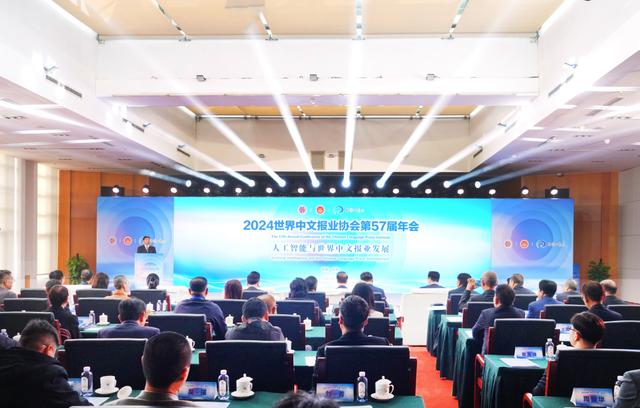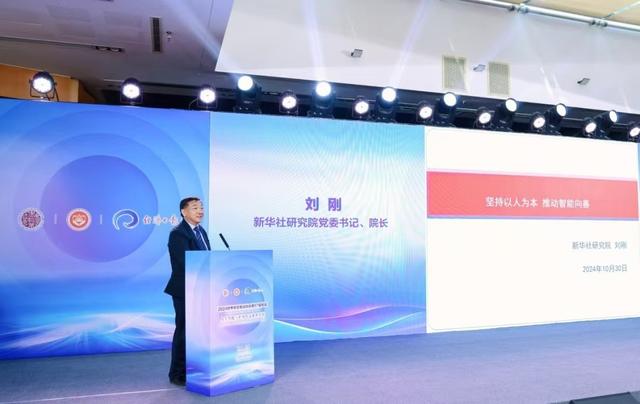The 57th Annual Conference of the World Chinese Press Association, co-organized by the All-China Journalists Association and hosted by the Economic Daily, opened in Beijing on October 30. With the theme of "Artificial Intelligence and the Development of the World Chinese Newspaper Industry", this annual conference has set up an opening ceremony, keynote speeches, sub-forums and other links. More than 100 guests including Chinese media leaders and think tank scholars from China and around the world participated. meeting.

Liu Gang, Dean of the Xinhua News Agency Research Institute, gave a keynote speech on "Adhering to People-Oriented and Promoting Intelligence for Good". Liu Gang believed that the history of media development itself is a history of technological change. In the era of artificial intelligence, media practitioners must keep up with the development of new technologies in order to have the best results. May be reborn through innovation.
From July to August this year, the research team of the Xinhua News Agency Research Institute conducted a questionnaire survey on global news media organizations in three languages: Chinese, English, and French. Finally, 1,094 valid questionnaires were obtained. Respondents came from 53 countries and regions, including newspapers, periodicals, Radio and television, news agencies, websites and media upstream and downstream industries, such as mobile application service providers. The research team also visited major national mainstream media, technology companies and scientific research institutes, conducted research around the opportunities and challenges, responsibilities and missions of news media in the artificial intelligence era, and completed the "Responsibility and Mission of News Media in the Artificial Intelligence Era" think tank report.

The report shows that only 10.2% can proactively embrace deep artificial intelligence and introduce it into the news product production process from top to bottom. However, it is being actively explored at the institutional level, and 41% of those encouraging and supporting the trial of some news business sectors have already reached 41%.
For those media who are waiting and watching, the survey shows that firstly, the internal culture of the media rejects automated rather than manual content production methods, and secondly, media audiences are resistant to content generated by artificial intelligence. Several other reasons conflict with the media's process regulations, talent structure, etc., which means that these media are almost not ready yet.
The survey shows that the current application scenarios of production artificial intelligence technology in the media roughly include 7 aspects, such as monitoring hot events or collecting news clues, planning topic selection or drafting outlines, and assisting editors such as verification, speech-to-text, subtitles, or translation. wait. In addition, in the field of creation, the production of charts, figures, posters, including anchor dubbing, etc., starts from content distribution to the precise calculation of algorithms, which will generate new drivers in all aspects of user interaction and business promotion.
From a positive perspective, that is to say, in terms of opportunities, artificial intelligence has three main aspects. One is the capacity-driven aspect, aggregating information and enriching sources; assisting production and optimizing quality; accurate portraits and personalized distribution; scientific evaluation and efficient management. The second is the brand-new experience, which transcends time and space and can be reached at any time; virtual and real integration, immersive; human-machine communication, expressing ideas and emotions. Third, in terms of business prospects, with the advent of the era of "everything is a media", the trends of media platformization and industrial digital intelligence are accelerating.
At the same time, the application of artificial intelligence also faces some challenges: 1. False information causes a crisis of trust. "Infinite mass production" is more disastrous; "deep forgery" is more confusing; "simulation propagation" is more covert. 2. The abuse of technology destroys the ecology of public opinion. Algorithmic bias induces individual cognition; robot trolls control public opinion; smart weapons intensify information confrontation.
Among the thousands of media surveyed, only 7.7% are very optimistic about the use of artificial intelligence, 16.4% are relatively optimistic, 9.7% are very pessimistic, and 26.7% are relatively pessimistic. It should be said that 40% of the media are in the process of observation, hoping that while artificial intelligence will bring convenience to people, it can also better benefit mankind. Strengthening the supervision of artificial intelligence has become the consensus of countries around the world. In this regard, the report puts forward three suggestions: one is to break the information fog with true news; the other is to use journalistic ethics to control instrumental rationality; and the third is to protect data privacy with standardized mechanisms.